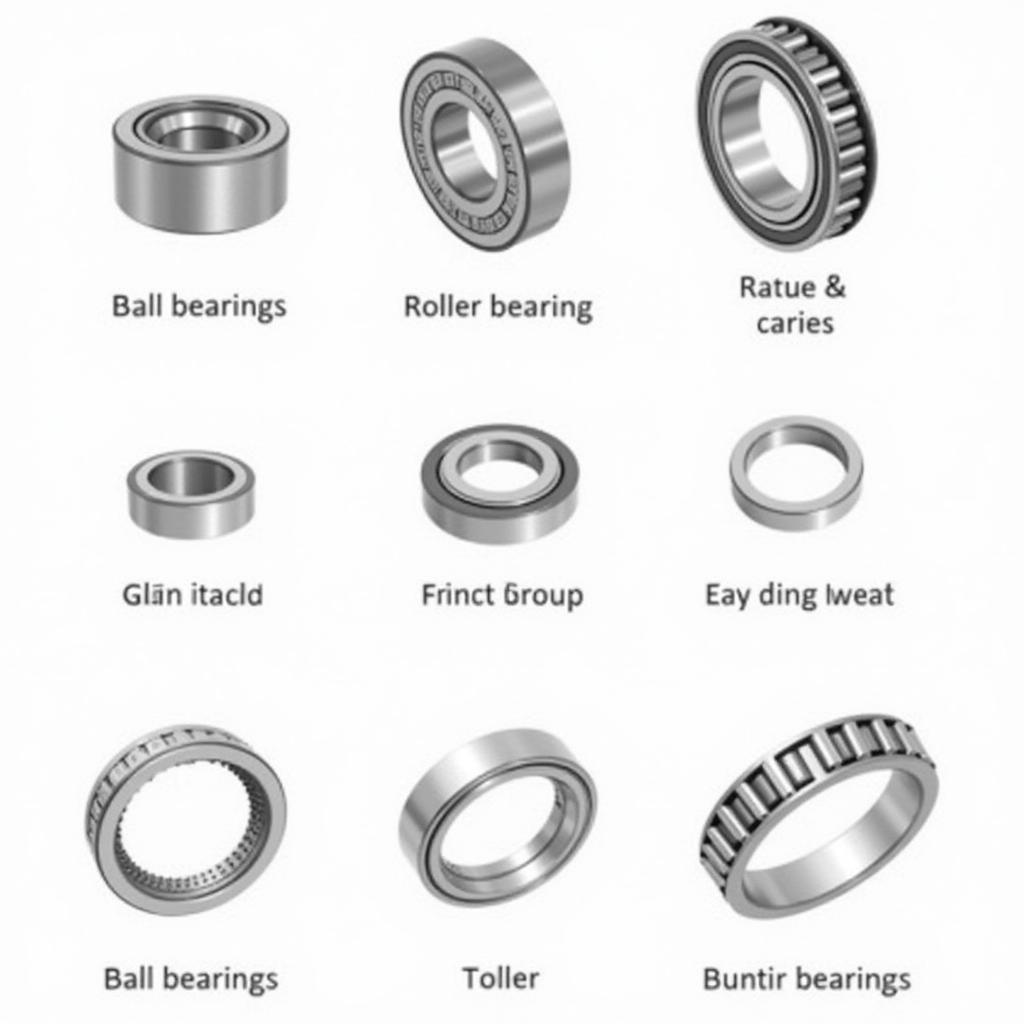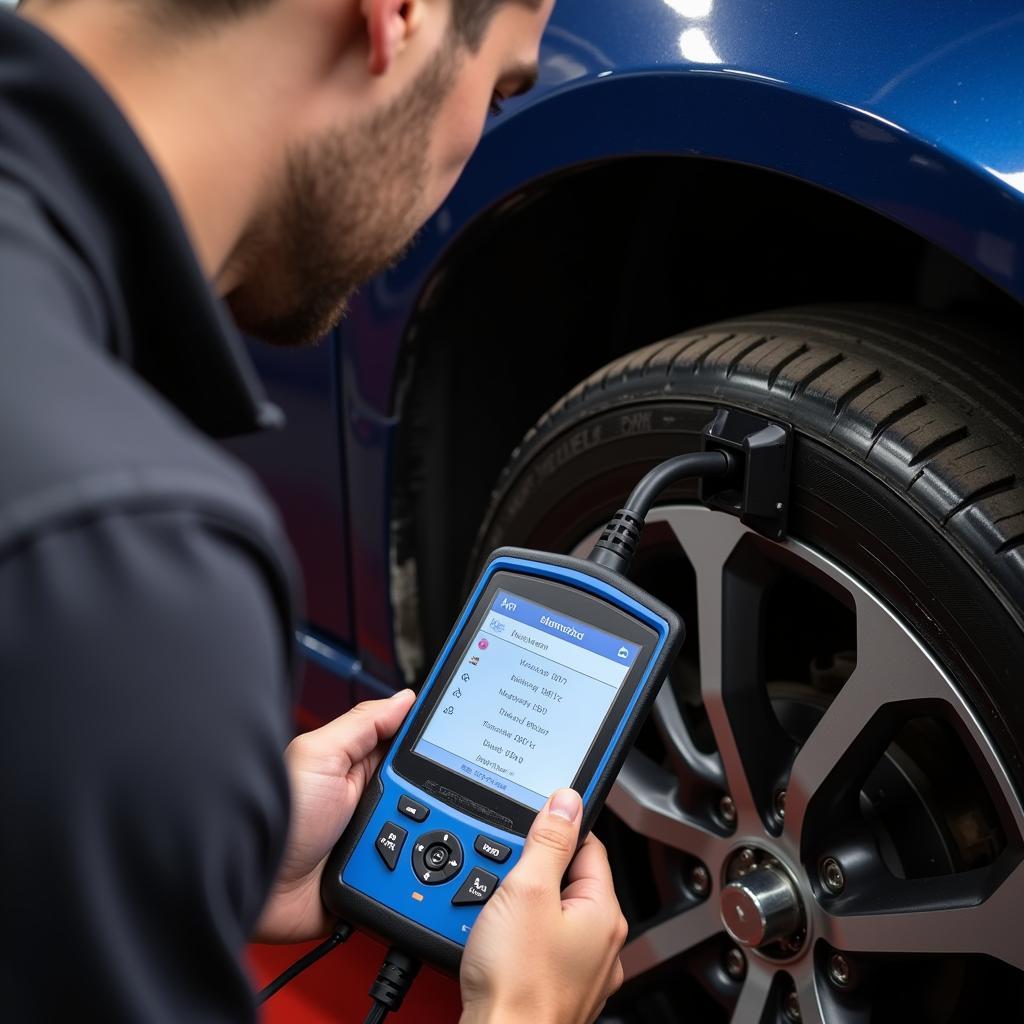Car bearings are essential components within your vehicle, contributing significantly to smooth operation and efficient performance. They support rotating parts, reduce friction, and manage loads, ensuring everything from your wheels to your engine runs smoothly. Understanding their function, types, and maintenance is crucial for every car owner.
What are Car Bearings and Why are They Important?
Car bearings are small, but mighty components found throughout your vehicle. They facilitate the smooth rotation of moving parts, minimizing friction and wear. Imagine trying to spin a wheel on a fixed axle – it would be difficult and create a lot of resistance. Bearings solve this problem by providing a low-friction interface between rotating and stationary parts. This reduces wear and tear, improves fuel efficiency, and ensures a quieter ride. Neglecting these crucial components can lead to costly repairs and even dangerous driving conditions.  Different Types of Car Bearings
Different Types of Car Bearings
Different Types of Car Bearings
Several types of car bearings exist, each designed for specific applications:
- Ball Bearings: These are the most common type, using small metal balls to reduce friction. They’re often found in wheels, steering systems, and alternators.
- Roller Bearings: These use cylindrical rollers instead of balls, offering greater load-bearing capacity. They’re typically found in transmissions and driveshafts.
- Tapered Roller Bearings: These handle both radial and axial loads, making them suitable for wheel hubs and other high-stress applications.
Understanding the different types can help you diagnose potential problems and choose the right replacement parts. Do you know which type of bearing is used in your car’s adult pedal car? Perhaps not, but it highlights the diverse applications of these components.
Common Signs of Bad Car Bearings
Recognizing the signs of worn-out bearings can prevent further damage and ensure your safety. Listen for these tell-tale indicators:
- Unusual noises: Grinding, humming, or growling sounds, especially when turning or accelerating, are often the first signs of bearing failure.
- Vibration: A vibrating steering wheel, floorboard, or seat can also indicate a bearing problem.
- Uneven tire wear: Worn bearings can cause uneven tire wear, impacting handling and braking performance.
- Play in the wheel: If you notice excessive play or looseness in the wheel when you jack up your car, it could signal a bad wheel bearing.
If you experience car shakes when braking, it might be related to worn bearings, though other factors could be involved.
How to Maintain Car Bearings
Proper maintenance can significantly extend the lifespan of your car bearings:
- Regular lubrication: Ensure bearings are adequately lubricated according to your vehicle’s maintenance schedule.
- Avoid overloading: Don’t exceed your vehicle’s weight capacity, as this puts extra stress on the bearings.
- Regular inspections: During routine maintenance, have a mechanic inspect your bearings for signs of wear or damage.
“Regular maintenance is key,” says automotive expert, John Miller, “Catching bearing problems early can save you a lot of money and hassle down the road.”
How are Car Bearings Diagnosed?
Diagnosing a faulty car bearing often involves a combination of visual inspection, listening for unusual noises, and physically checking for play in the wheel. A professional mechanic can use specialized tools and techniques to accurately pinpoint the problem. The use of a dealer scanner can be particularly helpful for diagnosing electronic components related to the bearing system, like ABS sensors.
“A dealer scanner provides a wealth of information, allowing us to quickly and efficiently identify the root cause of bearing issues,” explains Sarah Johnson, a certified automotive technician. You might be surprised to learn that even a rubber band car demonstrates basic principles of friction and motion, highlighting the importance of bearings in even the simplest of machines.
The Role of Dealer Scanners in Diagnosing Bearing Issues
While traditional methods are often effective, dealer scanners provide a more in-depth analysis of the vehicle’s systems. They can detect subtle changes in sensor readings, pinpoint the location of the faulty bearing, and even identify underlying electrical problems that might be contributing to the issue.  Dealer Scanner Diagnosing Bearing Issues
Dealer Scanner Diagnosing Bearing Issues
Do you need a reliable car hauler trailer for sale? Check out our resources.
Conclusion
Car bearings are critical components that ensure smooth and efficient operation of your vehicle. Understanding their function, types, and maintenance is essential for every car owner. Regular inspections and timely repairs can prevent costly damage and ensure your safety on the road. By staying informed and proactive, you can keep your car running smoothly for years to come.
FAQ
-
How often should I have my car bearings checked? It’s recommended to have your bearings inspected during every routine maintenance check-up.
-
What is the average lifespan of a car bearing? The lifespan varies depending on driving conditions and maintenance, but they typically last between 80,000 and 150,000 miles.
-
Can I replace car bearings myself? While possible, it’s generally recommended to have a qualified mechanic perform this repair.
-
How much does it cost to replace a car bearing? The cost varies depending on the type of bearing and the vehicle, but it typically ranges from $150 to $500 per bearing.
-
What happens if I ignore a bad car bearing? Ignoring a bad bearing can lead to further damage to the surrounding components, potentially resulting in costly repairs or even a breakdown.
Is a video tutorial on belt tension tutorial rc car redcat youtube helpful for understanding bearings? It might offer some insights into related concepts.
Have you ever experienced a wheel bearing failure? What were the symptoms you noticed?
For further information on vehicle maintenance and diagnostics, explore our other articles on DiagXcar.
Need help with your car’s bearings or other diagnostic issues? Contact us via WhatsApp: +1(641)206-8880, Email: [email protected] or visit us at 276 Reock St, City of Orange, NJ 07050, United States. We offer 24/7 customer support.


